Ng On Yee from Hong Kong claimed the women’s world title at the Northern Snooker centre in Leeds on Tuesday. In the best-of-11-final against Emma Bonney she trailed 0-2, before securing the title with six frames in a row. On her way to the final she beat ten-time World Champion Reanne Evans, who is the most popular – that is to say the only popular – female snooker player. This article is also available in German.
In parallel to the final, the first round of the Men’s Snooker Championship takes place. I can chose between two matches on two television stations I like to see. There is no broadcasting of the Women’s final, so I have to follow the live score online. When I tweet the ironic comment “Isn’t it nice, that we can watch it live?”, the first answer I get is: “Who wants to watch this?” Hasn’t this already happened????
On Thursday the Ladies Day took place in the Crucible Theatre, in order to make women’s snooker more visible. Every active member of the WLBSA seemed to be there to entertain the audience. Beside the recently crowned World Champion Ng On Yee, of course Reanne Evans attended the event. After her tight defeat in the first round of the WCS Qualifiers against Ken Doherty, you could hear whispers, whether she deserves a wildcard fort he main tour or not.
A sexist present?
Barry Hearn, Chairman of World Snooker (and after Steve Davis in 2014) this year the self-proclaimed gender expert, stated in this discussion more than once, what he thinks about this idea. So he replied to snooker journo Andy Goldstein “Have you asked Reanne if she wants this sexist present!?” and a few minutes later he already knew the answer: “A bit sexist for me mate. Sure as a pro she would far rather earn her spot rather than have it gifted.” The Gender-Equalitiy-Expert of SnookerPRO says: „Who’s not confect with foreign wording shouldn’t candle with it.“ Perhaps he should look up this expression, before he uses it to kill reasonable requests and good arguments.
First of all we are not talking about patronising presents. We are talking about rules. If the men’s U-21 World Champion gets a tour card, why not the women’s World Champion and U-21 World Champion? And so that they are not so lonely in the boy’s club (quote Evans), every semi-finalist should get a two years card. By the way Evans responded to the question, that Hearn would never ask her, quite clearly: “I just want to play snooker, if they offer you a wildcard you are not going to decline. I would take any opportunity I get to play.”
One of the arguments against the wildcard is the fact that Evans couldn’t win any match during her last attempt on the tour in 2010/2011. What kind of argument is this? (Please take a look at the statistics of Ryan-Clark) One single year is nothing to establish oneself on the tour. Evans says: “You need to play in those conditions to improve your game.” And Stephen Hendry confirms this appraisal: It takes time, experience und you need the challenge. “You only improve by playing better players. It was the same when I started playing. You’ll obviously lose more than you’ll win at the beginning. But you learn every time you get beat.”
Backing means respekt.
What does women’s snooker need – like Ng On Yees stated – to close the gap to the men’s’ sport? Year in and year out Reanne Evans says the same: “We need backing. We need opportunities.” And they need a culture of welcome paired with respect.
Ten time world champion Allison Fisher said a few years ago that she left the snooker circuit for playing pool, because she never earned the respect she deserved. Back then when she played in the Matchroom League, other players didn’t accept her as a normal opponent. For example she beat Neal Foulds, Tony Drago and Mike Hallett and they didn’t take it too well. “They have big egos and a lot of the guys couldn’t cope with losing to a female”, Fisher said. There were exceptions to the misogynistic mean. Here you can see that the different person’s attitude is responsible for the feeling of being welcome: “I paired up with Steve Davis and won three world doubles titles. John Parrott and Stephen Hendry played me like a player, not like a girl. Jimmy White was always wonderful.”
“There are no barriers for women.”
So says Jason Ferguson, World Snooker Director. Evans can tell about different experiences. She still experienced – like Allison Fisher years ago – to be inadequate as a player. She has known it to happen that she wasn’t allowed to play in several clubs, but sometimes the opponents themselves are the problem. Ken Doherty was very relieved after the tight defeat: “If I’d lost I’d possibly never hear the end of it, a bit like the black I missed for a 147 at the Masters – it would have been that all over again.”
What does it reveal about the status of a woman in the snooker circuit when a man is desperate to win against her? How is a woman estimated, if a defeat against her is pretty embarrassing and the media has no other subject? Does this sound like equality? [If you’re unsure, please take a moment to think about it.]
Everybody who’s involved are agreed on this: If women’s snooker shall develop two main pillars are needed: the possibility to compete on the main tour for the best female players and a separate women’s tour. More competition, better structures and: more money. Whilst the top prize for the men’s’ title is 300,000 £ and they earn 6.000 £ with only one win in the qualifiers, the female champion only gets a fractional amount. For her 10 titles Evans probably got barely 6.000 £. At the moment the calculation is like this: no visibility-no interest-no sponsors-start over.
The Future
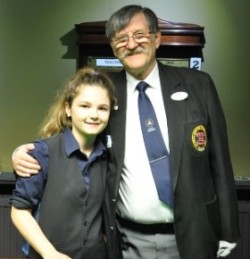 More optimistic, however, is that there are new faces in women’s snooker, and it’s not all on Reanne Evans’ shoulders. Beside On Yee another talented lady (photo: on the left) got a lot of attention. We will see if 15 year old Jasmine Bolsover, who has won not only the U-21 Title but also the pairs with Reanne Evans, sometime – when she’s grown up – will find an effective environment. I fear there’s no chance to get it sooner.
More optimistic, however, is that there are new faces in women’s snooker, and it’s not all on Reanne Evans’ shoulders. Beside On Yee another talented lady (photo: on the left) got a lot of attention. We will see if 15 year old Jasmine Bolsover, who has won not only the U-21 Title but also the pairs with Reanne Evans, sometime – when she’s grown up – will find an effective environment. I fear there’s no chance to get it sooner.
I still wonder: is the governing body really interested in developing this subject? Or will it stick to this lip service „One day a year for the ladies“?







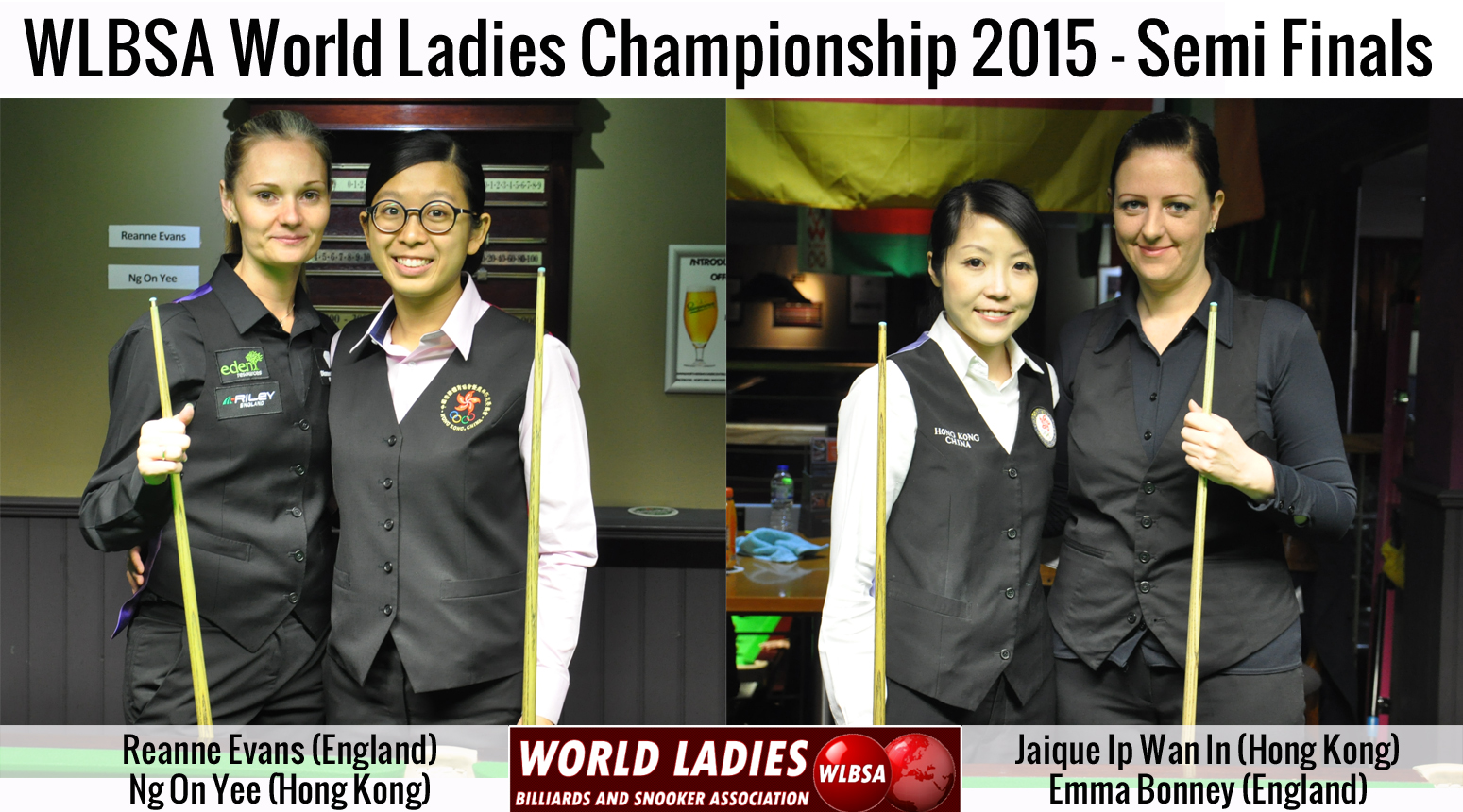

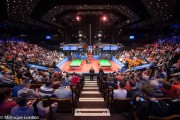

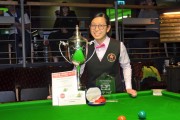


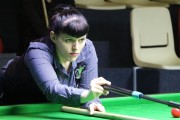
Love all the enthusiasm and press coverage the girls are getting at the moment. They only thing I can’t work out is whether they want the IBSF women’s champion or the WLBSA champion to get a spot for the maintour. because Evans‘ streak of 10 titles was WLBSA but the maintour spot for the men is decided in the IBSF events, isn’t it?
I don’t know if I get your question right.
My point is: a few years ago World Snooker Association decided to offer the winners of the IBSF (U-21) Worldchampionship a place on the Main Tour. This is an official way for (male) amateurs to get on the tour. If Word Snooker really wants to improve women’s snooker, why do they not decide to offer the winner of the IBSF (U-21) Worldchampionship for women and the WLBSA World Champion a place on the Main Tour?
In my opinion it’s only a question of rules they have to make/change.
Not quite I’m afraid.
Currently the winners of the IBSF: Men & U21 Championship (as do the EBSA Men & U21 Champions) get a spot on the maintour.
I wanted to know who would get the ladies maintour spot: the WLBSA world champion or the IBSF women’s world champion (and their respective U21 winners) because the ladies have two world championship competitions which differ a lot in the number of players and number of participating nationalities.
According to you it will be the WLBSA winner. (I don’t mind which, I’m happy if we get a gal on the tour again ;-)
I’m sorry. If you want to know who would get the ladies maintour spot, I’m afraid the answer is: nobody. I don’t believe that Barry Hearn or somebody else at World Snooker Association is seriously thinking about it.
I’m only trying to ask questions. But I fear „according to me it will be the WLBSA winner“ is only a wonderful dream…